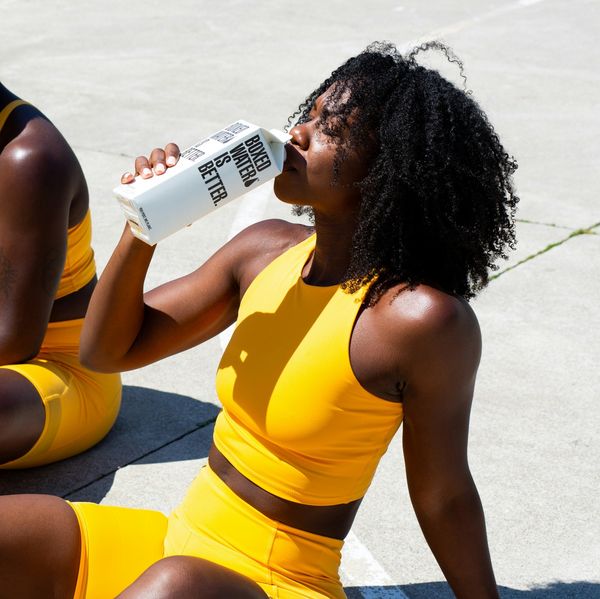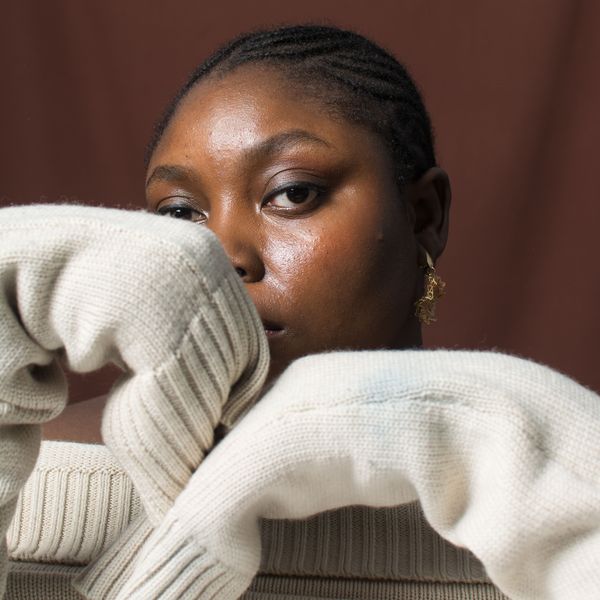How Q. Nicole Is Breaking The 'Grass' Ceiling In The World Of Cannabis
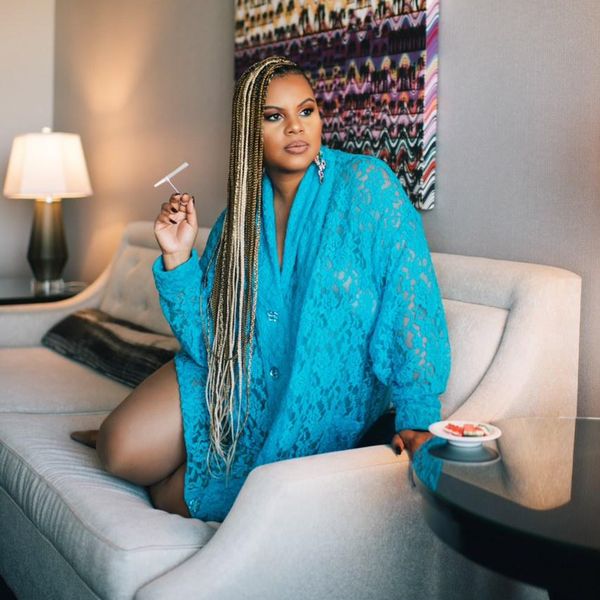
Gummies, tinctures, edibles. Indica, Sativa, or hybrid. No matter how you consume this multifarious plant, cannabis's ability to shape-shift emphasizes the many ways it can be enjoyed as well as the plethora of business opportunities that can stem from it. For decades, stigmas surrounding cannabis and marijuana have prevented Black women from experiencing the joys of computation along with the health benefits that the plant provides. From decreasing stress and easing anxiety, to relieving joint pain, migraines, and menstrual cramps, this plant has a lot more to offer than the cultural taboos that ellipse it.
Today, the cannabis industry continues to climb as one of the largest growing markets in the country, projected to reach $30 Billion by 2025, through the Farm Bill of 2018 and the reclassification of cannabis in 2020. Although this comes with restrictions, this shift in the regulation has opened the door for opportunities surrounding hemp-derived products to be explored by those who have been disproportionately left out of the industry. As a result, one woman is on the mission to not only destigmatize the language around cannabis while equipping Black folks with the tools (and kits) needed to launch their own CBD empire.
Like most ambition-driven women, Q. Nicole started her corporate career with a plan. "I'm Generation X, and we were taught college + good job = financial security." Upon graduating from college, Q. would soon become a six-figure earner with a rampant 12-year career trajectory that laid the foundation to eventually, "walk on water" and live out what she calls "a cushiony life." But even the most diligent readiness could not prepare her for the abrupt passing of her father in 2013.
At the time, she found herself drowning in the grief of the recent loss while attempting to balance the demand of her transition from corporate life into full-time entrepreneurship. The hectic nature of her work-life balance triggered a deep emotional response that was so unfamiliar, she knew it was time to seek professional help. Shortly after, her therapist diagnosed her with delayed PTSD, a response to her father's death. Her loss triggered an inability to cope.
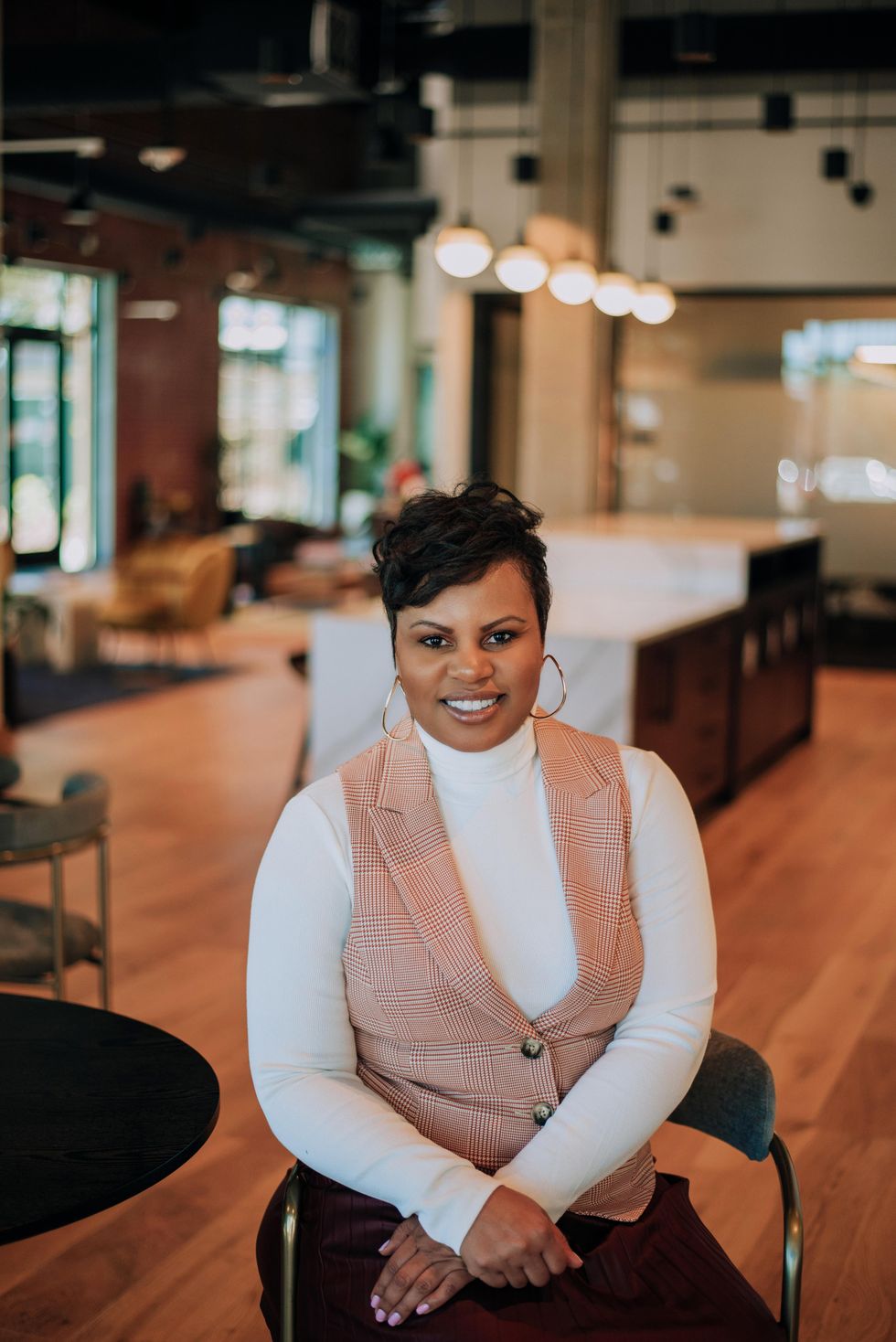
During the heaviest points of Q.'s healing process, she was recommended by a psychiatrist to explore opioids to balance her mood. Yet, something about the drug didn't sit right with her, so she sought alternative options. Since medicinal marijuana was legal in her state, she was able to get approved for a license to explore plant-based options to deal with the anxiety and depression that were a result of her PTSD. "That was my introduction to the space as someone who genuinely was a patient." She continues, "I was broken, emotionally. I was in a very fragile place and cannabis saved my life."
This turning point allowed Q. to regain control of her life and reestablish her emotional and professional momentum. Now, Q. Nicole leads WH Farms, a five-acre, three-greenhouse farm located in Eastern North Carolina. She aims to equip Black folks with everything needed to build their own consumable products through the CBD Business Launch Kits and puff, puff, pass the baton into the booming hemp industry that awaits them.
xoNecole: Tell us more about the work you do with WH Farms.
Q. Nicole: Our farmers are African-American legacy farmers which is huge to our story. We're growing with farmers who have had this land for 100s of years, from their sharecropper ancestors who were first-generation slaves. So that's a part of the heritage that we're proud of when purchasing products. I'm a country girl and I've always felt like mobilization is a part of my purpose. WH Farms currently has 200 acres of land that we can pull from. The farmers wanted to protect themselves from large corporations that sought to extract from their land and not pay them their worth. So we wanted to partner with them and whatever our overflow was, we could source it from legacy farmers.
Were there any stigmas that you had to detach yourself from before exploring cannabis?
I had my preconceived notions. I came from corporate real estate development, so everything I did was about my career advancement. Playing with what was considered a drug was very "anti" my professional development path. But I was open to understanding the medicinal benefits because I saw so many high-profile professionals using it. I would be in conversations with physicians and surgeons and they would talk about how they would grow the plant at home. It made me realize that society had established a stigma that was "urban", but in reality, the plant wasn't just for "urban" use. I became a little bit more open-minded, but at that time of transitioning into full-time entrepreneurship, I did what I needed to do to not compromise my professional standing.
You have a background in real estate and corporate development. What was the transition like for you pivoting from the corporate world into entrepreneurship?
Being in real estate and understanding a number of things about the economy and marketing, I understood that the cannabis industry was exploding and I wanted to be a part of the solution. I wanted to be a part of bringing it to the market for the other corporate, straight-laced individuals, especially African-American women like myself who would otherwise suffer in Corporate America because of the stress that comes along with being an achiever. They place more on you, they expect more from you.
You have the responsibility on the shoulders as the woman and now she's in this corporate environment struggling. But here's this plant that she can drop in her coffee in the morning and have a completely different experience. It was so important for me as a corporate girl to come to the table and say, "Listen, [cannabis] is nothing to be afraid of. Stress is a silent killer and if we're not able to identify ways to relieve our stress in a very tangible way, on a daily basis, then we're going to find ourselves as a community losing to some of these silent killers."
"It was so important for me as a corporate girl to come to the table and say, 'Listen, [cannabis] is nothing to be afraid of. Stress is a silent killer and if we're not able to identify ways to relieve our stress in a very tangible way, on a daily basis, then we're going to find ourselves as a community losing to some of these silent killers.'"
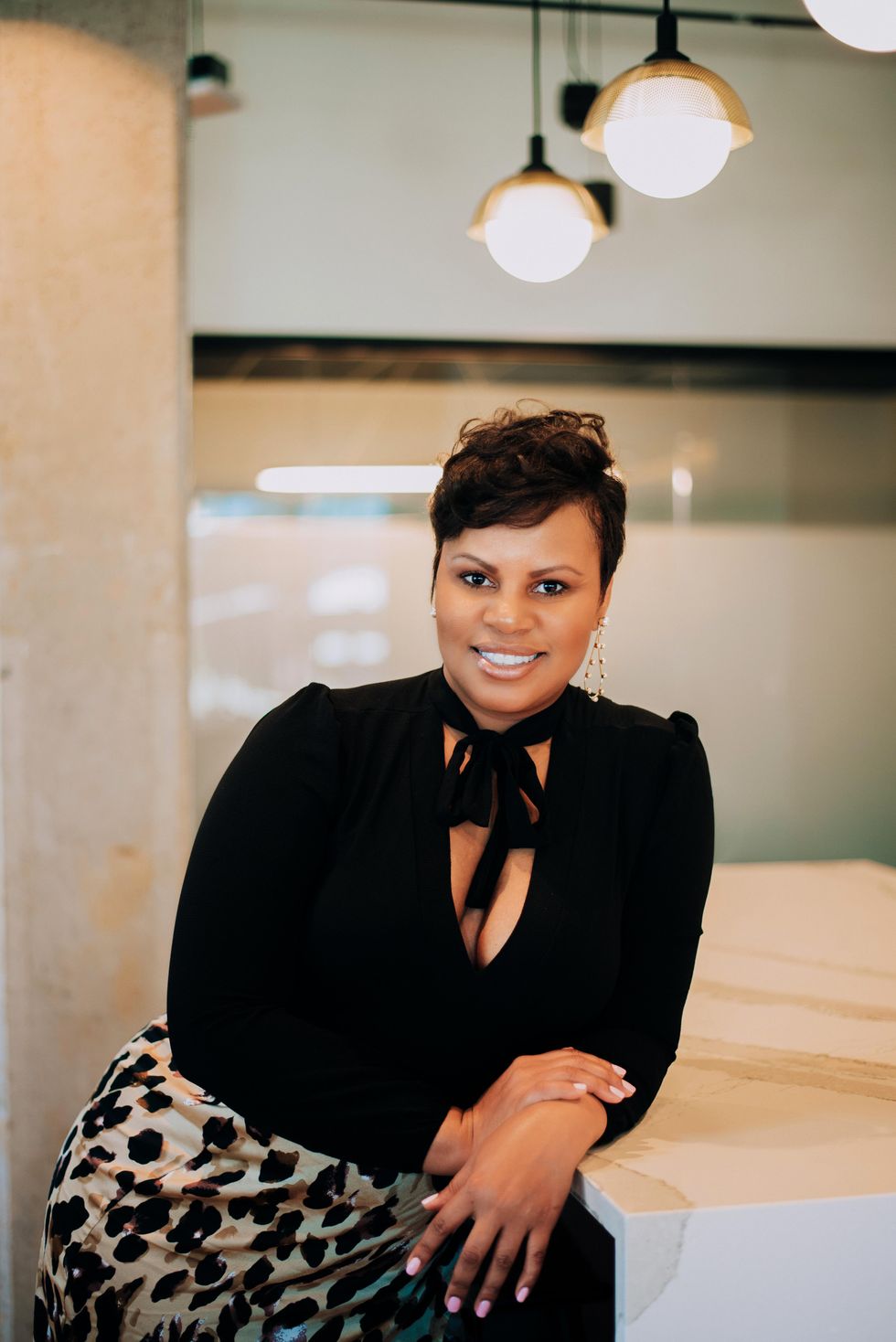
Courtesy of Q.Nicole
How do you see the match between Black creativity and the hemp-derived product industry complementing one another?
I see nothing but Black wealth, Black advancement, and Black opportunity. This is why I'm so passionate about the Launch Kits and what our farm does. We know this plant, maybe not the technical-scientific data, but we know the way it makes people feel, we know the weight, we know how much it's worth. When you take that transferable skill and talk about the Black men who are a part of STEM programs looking for ways to add cannabis to technology, that skill is helpful.
Cannabis goes well in so many different forms, it has chemical qualities that help with hair growth and fight acne. There are ways that the industry needs to be supported by science, manufacturing, technology, and chemistry. So when you talk about a group of people who have certain soft skills and are already exposed to the plant, we're not starting from scratch, we're starting from a basic understanding of it.
How were you able to adapt to the shift in your purpose?
I don't think that I ever shifted purpose. I understood very early in my purpose walk that my purpose would always expand. Jullien Gordon [real estate entrepreneur] and I were professional buddies, and he shared that, 'if it's truly your purpose, it'll always just expand into a new version of itself.' WH Farms is just a continuation and expansion of the same purpose: I educate and empower. There's a lot of people who don't know about cannabis.
Since I grow it, I can educate them and empower them to have their own CBD product line and be positioned to take advantage of what this industry has to offer. As a business owner and CEO, I always want to build a business that helps people create more than they already have, learn more than they already know, and believe they can have more than they already have.
You’ve tapped into two industries (real estate and cannabis) that are known for their high return and opportunity for growth. How has navigating these growing markets shaped your views on generational wealth?
It's taught me that generational wealth is a goal and it should be an expectation, but it should never be confused with something that's easy. I think it is a necessary collective reset because it's a great buzzword, but what does it really take? To be a woman in the entrepreneur space, I've had to fight to not be backdoored on deals not only to get respect but to receive the compensation I deserve. Same for the cannabis industry.
It's still the Wild Wild West, it's still a developing industry and because of that, it takes courage, bravery, and the ability to manage risk. The guts that it takes to play in these spaces for generational wealth reminds me that it's something that isn't free, it comes with a price and it comes with perseverance. It's not always easy but it's always purpose, it's always valuable, and my ancestors also fought for it.
"The guts that it takes to play in these spaces for generational wealth reminds me that it's something that isn't free, it comes with a price and it comes with perseverance. It's not always easy but it's always purpose, it's always valuable, and my ancestors also fought for it."
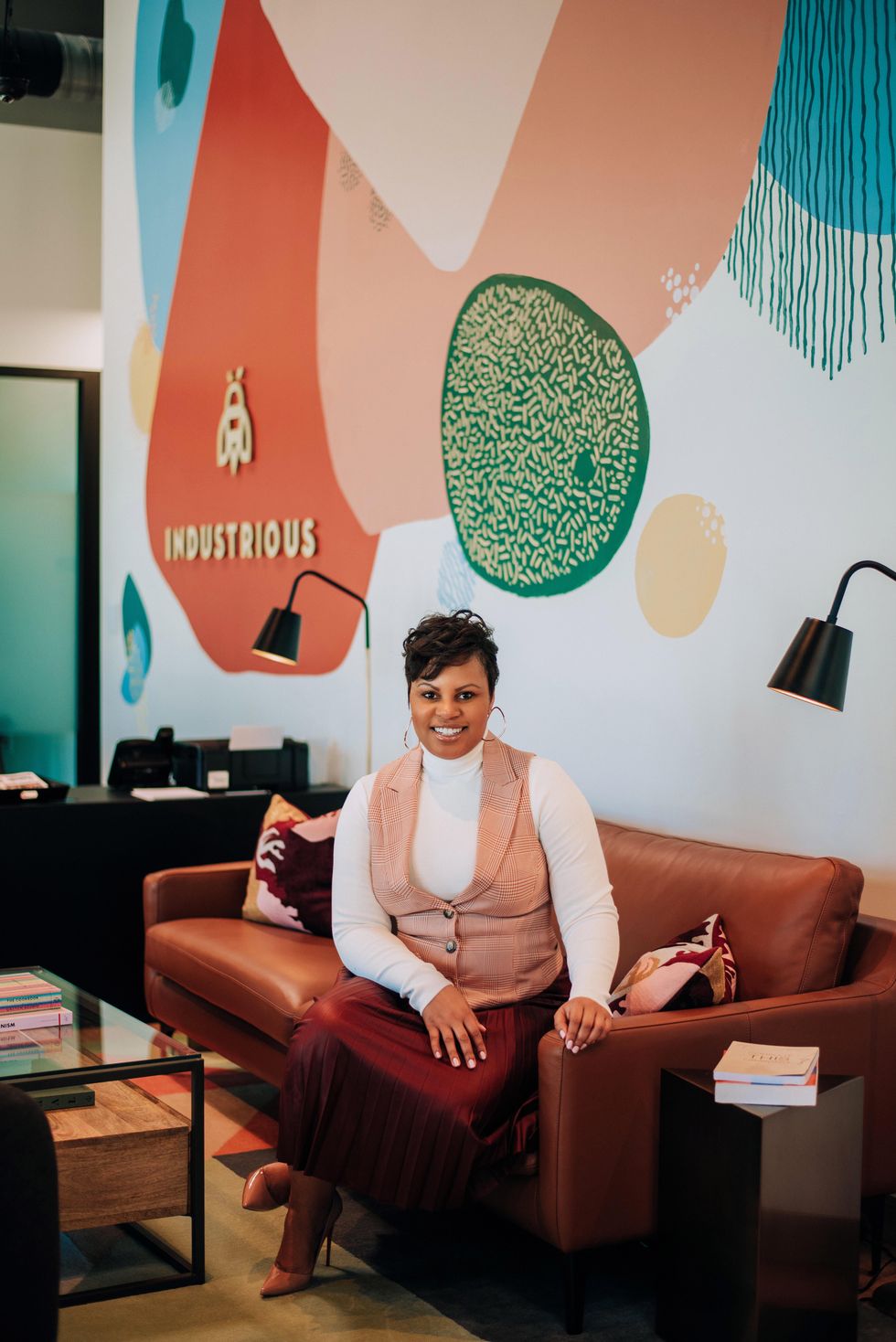
Courtesy of Q.Nicole
I think sometimes there’s a push to encourage women to go after entrepreneurship, but we’re rarely told how to balance the weight of it. As a serial entrepreneur yourself, what are some tools that help you find balance in all that you put your hands to?
I find that there's never balance, it's only harmony and that's the first permission that I gave myself. I seek harmony and that gives me a different metric to measure by. Everyone knows I have my phone on 'Do Not Disturb' from 9 a.m. to 9 p.m., Monday through Friday. That's because I have to hear myself. All calls are scheduled and I don't do a lot of distractions. I have to make sure that I am able to bring forth what I feel I'm supposed to be putting into this business and stay ahead of it.
I work in chunks, I'm big on grounding, I make sure I do meditation in the morning, and I love my CBD tinctures and smokable herbs in the morning -- it helps with mental focus and gathering my thoughts. I leave work at work and keep home at home; I am a person who attempts to separate the two. I think that the way to be present in these various relationships, especially my relationship as a wife and my role as a wife because that is certainly a priority for me before business. I don't let things bleed, I'm very compartmentalized.
"I think we have to give ourselves grace in the human experience and the permission to turn the poison of our mistakes, of the doubt, setbacks, and the hate into the medicine that fuels us and turn it into lessons and inspiration."
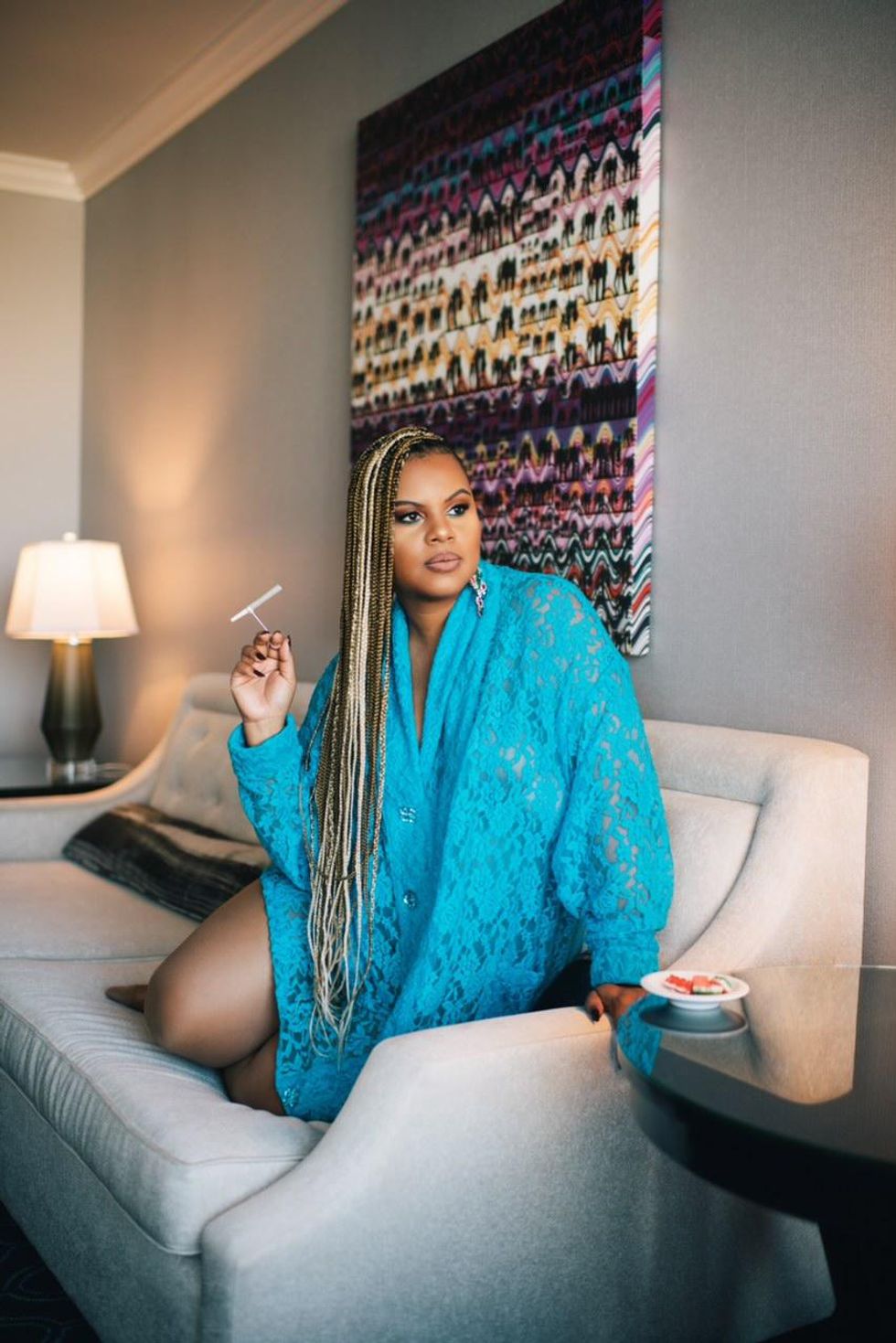
Courtesy of Q. Nicole
What advice would you share for those starting in entrepreneurship?
Learn how to comfortably turn poison into medicine. You're going to fail, you're going to fall, things aren't going to go right, it's going to be stressful. You may look at yourself and say, am I actually doing it right? All of these aspects of the journey are pretty uniform to everyone's journey because this is the journey. And I think we have to give ourselves grace in the human experience and the permission to turn the poison of our mistakes, of the doubt, setbacks, and the hate into the medicine that fuels us and turn it into lessons and inspiration.
To learn more about how you can get your own CBD Business Launch Kit, click here. To stay connected to Q.Nicole's mission, follow her here.
Courtesy of Q. Nicole
This Is How To Keep 'Holiday Season Stress' From Infecting Your Relationship
Hmph. Maybe it’s just me, but it seems like there is something really weird happening in the fall season air (because winter doesn’t officially begin until December 21) that cuddle season is in full swing while break-up season is as well. In fact, did you know that break-ups are so popular during the holiday season that December 11 is deemed Break-Up Day?
The reasons why relationships shift around this time vary; however, I did both roll my eyes and chuckle when I read that a very popular one is because it’s an easy way to get out of getting one’s significant other a Christmas present. SMDH.
Anyway, I personally think that the less shallow folks out here may contemplate calling things “quits” or they at least distance themselves a bit from their partner (and what I’m referring to is serious relationships) due to all of the stress and strain that oftentimes comes with the holidays whether it be financial, familial, due to their tight schedules or something else.
Listen, I would hate for you and your man to miss the fun and happiness of experiencing this time of year, all because you are so overwhelmed or irritated that you can’t really enjoy it. That’s why I have a few practical tips for how to avoid allowing the typical holiday season stress from INFECTING your relationship.
Manage Your Expectations
 Giphy
GiphyUnmanaged expectations. If there is a main reason why the holiday season tends to be so stress-filled for so many people, I’d bet good money that this is the cause. And when you’re in a long-term relationship, expectations can manifest themselves in all sorts of cryptic and/or unexpected ways. You might have relatives who assume that you are going to be with them for Thanksgiving or Christmas when you have other plans in mind. You might be thinking that you are going to spend one amount for presents while your man is thinking something totally different. When it comes to scheduling, your signals may be crossed.
And you know what? To all of these scenarios, this is where clear and consistent communication come in. Don’t assume anything. Don’t dictate anything either. From now until New Year’s, mutually decide to check in once a week, just to make sure that you are both on the same page as it relates to the holidays and what you both are thinking will come along with it. The less blindsided you both feel, the less stressed out you will be. Trust me on this.
Set (and Keep) a Budget
 Giphy
GiphyOkay, so I read that last year, 36 percent of Americans incurred some type of holiday-related debt. Hmph. Last year, there was still some sense of normalcy in this country, chile, so I can only imagine what finances are gonna look like over the next several weeks. That said, since I don’t know a lot of people who don’t find being broke stressful, make sure that you and your bae set a budget and then stick to it this year — no ifs, ands or buts.
Because really, y’all — it doesn’t make sense to deplete savings and/or max out credit cards for a few days of giggles only to be damn near losing your mind because you don’t know how to make ends meet come Dr. Martin Luther King, Jr. Day.
And by the way, this tip doesn’t just speak to things like food and gifts; I also mean travel. If it doesn’t make a ton of sense (or cents) to be all over the place this year — DON’T BE.
Keep Matthew 5:37 at the Forefront
 Giphy
GiphyIf off the top of your head, you don’t know what Matthew 5:37 says, no worries, here ya go: “But let your ‘Yes’ be ‘Yes,’ and your ‘No,’ ‘No.’ For whatever is more than these is from the evil one.” That verse right there? Oh, it’s a boundaries lifesaver! I say that because do you see “maybe” or “I’ll think about it” in there? Nope. LOL. It says that you should tell people “yes” or “no” and leave it at that — and that complements Anne Lamott’s quote, “’No’ is a complete sentence” impeccably well. Yeah, you’ve got to remember that anything beyond a yes or no to a request is privileged information; you don’t owe anyone details or an explanation.
Besides, if you are really honest with yourself, when someone asks you something and you give a “Umm, let me think about it” kind of reply, more times than not, you already know what your answer is going to be — so why not let you both off of the hook? Give your response. Commit to that. And let everyone (including yourself) get on with their lives and schedules.
I promise you that when it comes to those holiday parties, you are pissing more folks off by not RSVP’ing or doing so and not showing up than just saying, “Thank you but not this year” off the rip.
Remember That Your Personal Space Is Privilege Not a Right
 Giphy
GiphyA friend of mine recently bought a new house and invited me over to come see it. He’s a single man with no children, so as I was taking in all of the space that he had, especially as I walked through his finished basement, I joked about relatives coming to live with him. “Hell no” and “absolutely not” were pretty much his immediate responses as he went on to say that some folks even had the nerve to be offended when he told them that he had no intentions on taking DNA in.
Ain’t it wild how people think that your stuff is their right? And yes, that brings me to my next point. Your home is your sanctuary space. If you want to host folks this year — cool. If not, ALSO COOL. Please don’t let folks (family included) guilt you into how they want you to act or even into what they would do if the shoe was on the other foot. You are not them — and as one of my favorite quotes states, “If two people were exactly alike, one of them would be unnecessary.” (A man by the name Larry Dixon said that.)
Hell, my friends? They know that I am good for sending them random things that they need or even want all throughout the year. Coming over to hang out at my pace, though. Uh-uh. Chalk it up to being a card-carrying member of the ambivert club yet I like keeping my living space personal — and I sleep like a baby, each and every night, for feeling that way.
Always remember that your space, your time, your resources, your energy and shoot, yourself period (including your relationship), are all things that are your own. You get to choose how, when and why you want to share them. The holiday season is certainly no exception.
Cultivate Some “You Two Only” Traditions
 Giphy
GiphyIt’s not uncommon for some couples to hit me up after the holiday season to “detox.” Sometimes it’s due to the financial drama (and sometimes trauma) that they experienced. Sometimes it’s because they allowed their relatives (especially in-laws) to get more into their personal business than they should’ve. More than anything, though, it tends to be because they didn’t get enough quality time together and so ended up feeling “disconnected.”
Please don’t let that happen. Listen, I’m not even a holidays kind of woman and yet, I will absolutely sit myself down with some hot chocolate and chocolate chip cookies to enjoy a Hallmark holiday film or two. Aside from the fact that most of them are lighthearted and sweet, I also like that they usually focus on couples loving on each other amidst all of the holiday beauty and ambiance — which is something that all couples should set aside some time to do.
Maybe it’s a vacation. Maybe it’s a staycation. Or maybe it’s my personal favorite, A SEXCATION. Whether it’s for a few days, the weekend or even overnight — don’t you let the holidays go by without setting aside time for you and your man to celebrate one another. Don’t you dare (check out “Are You Ready To Have Some Very Merry 'Christmas Sex'?”).
GET. SOME. REST.
 Giphy
GiphyI once read that 8 out of 10 people get stressed out over the holidays and 3 out of 10 lose sleep during to it — and when you’re stress-filled and sleep-deprived, that can absolutely lead to hypersensitivity, making mountains out of molehills and even not being in the mood for sex.
Your relationship can’t afford to go through any of this, so definitely make sure to prioritize rest. I don’t care how unrealistic it might seem during this time, sleep should never be seen as a luxury; it will always and forever be a great necessity.
That said, try to get no less than six hours of shut-eye in (check out “6 Fascinating Ways Sex And Sleep Definitely Go Hand In Hand”) and even ask your bae to take a nap with you sometimes (check out “Wanna Have Some Next-Level Sex? Take A Nap, Sis.”). Not only will sleep help to restore your mind, body and spirit but, when it’s with your partner, it’s an act of intimacy that can make you both feel super connected, even in the midst of what might feel like chaos.
___
Holiday season stress is real. Still, never give it the permission or power to throw your relationship off. Put you and your man first and let the holidays be what they are gonna be, chile.
Let’s make things inbox official! Sign up for the xoNecole newsletter for love, wellness, career, and exclusive content delivered straight to your inbox.
Featured image by Shutterstock
Don Benjamin On New Projects, Family & How He And His Wife Healed After Public Split
Actor and model Don Benjamin continues to expand in his career while also being a present husband and father. We first learned of the model in 2013, competing on America's Next Top Model Cycle 20, and now he's starring in major films like the recent Jordan Peele movie HIM and Adopted 2.
He was even the leading man in Cardi B's latest music video "Safe," which also features Kehlani. In an exclusive xoNecole interview, Don opens up about his family and this phase in his life.
"Honestly, the funny thing is, it's just like any other phase," he admits. "I just focus on work and growth and leveling up. I'm super excited about this moment because now, I'm finally tapping more into my acting side of stuff." He also shows off his acting skills on social media. Don, along with his wife, Liane V, often shares cute family skits on their respective Instagram and TikTok pages.
The couple share two kids, 2-year-old daughter Zaia Sky and Zaiden, who they had in June 2025. According to Don, Zaia is already following in his footsteps. "She's already doing more modeling jobs than me as of lately, and we want to get her in some acting. She loves the camera," he says. "It'll be nice to see if she follows in my footsteps, and I can kind of help line some things up for her."
Don and Liane have been married for four years, but had a very public breakup the year before. The Scared Famous star reveals how they did the work to heal and move forward together.
"We had our time to separate and work on self-growth, things that I needed to do for myself as a man, and working with life coaches and therapists, and she got the time to do what she needed to do. So when we came back together, we were in the right space mentally. We got a relationship coach that we can go through things with and talk about and work on and these things were important for us. Now, over the years, I feel like that actually helped us come closer together. That moment helped us come closer together."
"We had our time to separate and work on self growth, things that I needed to do for myself as a man, and working with life coaches and therapists, and she got the time to do what she needed to do. So when we came back together, we were in the right space mentally."
He continues, "I did what I had to do to understand [that] as a man, I never really had any male guidance in my life. So it was able to align me with the right coaches and pastors and therapists and people that I needed to align with to work on things that I had been dealing with in life. Then she got the space that she needed as a woman to work on her independence.
"We came back together strong, and now we were able to get married in the right space. A lot of times, people jump into marriage when they're not fully healed or in the right headspace. So we were able to get married in that right space. For us, it's been a beautiful thing, and we're able to use that as as an example."
Don also believes it's important to set an example for their kids, especially when it comes to love and respect. While the actor grew up without his dad, he has made it his priority to instill love in his kids by showing up for them and giving them words of affirmations.
As far as what's next for Don, he is starring and executive producing a paranormal activity film titled, holySmoke. "I'm loving the drama and horror space right now," he says.
"I always love a good romantic comedy, but right now. I seem to be getting reeled into all these horror films and thrillers and dramas."
Let’s make things inbox official! Sign up for the xoNecole newsletter for love, wellness, career, and exclusive content delivered straight to your inbox.
Feature image Nikita Melvil



